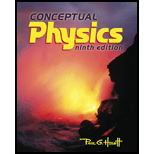
What does it mean to say that if a hypothesis is scientific, then there must be a means of proving it wrong?
To Explain: A hypothesis is scientific, then there must be a means of proving it wrong.
Explanation of Solution
Introduction:
Science deals with discovering new fact and relationships with observable phenomena in nature. A hypothesis is an educated guess that is not fully accepted.
Scientists hypothesis not get fully accepted until it is demonstrated by an experiment. To determine whether the hypothesis is scientific or not there must be a test for proving it wrong. If there is no test to prove it wrong then the hypothesis is not scientific.
Conclusion:
To test hypothesis is scientific or not then to prove it wrong there is test to prove it wrong.
Chapter 1 Solutions
CONCEPTUAL PHYSICS-W/PRACTICING PHYSICS
Additional Science Textbook Solutions
Chemistry: Structure and Properties (2nd Edition)
Laboratory Experiments in Microbiology (12th Edition) (What's New in Microbiology)
College Physics: A Strategic Approach (3rd Edition)
Microbiology: An Introduction
Campbell Biology: Concepts & Connections (9th Edition)
Cosmic Perspective Fundamentals
- What is the resistance (in (2) of a 27.5 m long piece of 17 gauge copper wire having a 1.150 mm diameter? 0.445 ΧΩarrow_forwardFind the ratio of the diameter of silver to iron wire, if they have the same resistance per unit length (as they might in household wiring). d. Ag dFe = 2.47 ×arrow_forwardFind the ratio of the diameter of silver to iron wire, if they have the same resistance per unit length (as they might in household wiring). d Ag = 2.51 dFe ×arrow_forward
- Show that the units 1 v2/Q = 1 W, as implied by the equation P = V²/R. Starting with the equation P = V²/R, we can get an expression for a watt in terms of voltage and resistance. The units for voltage, V, are equivalent to [? v2 v2 A, are equivalent to J/C ✓ X . Therefore, 1 = 1 = 1 A V1 J/s Ω V-A X = 1 W. . The units for resistance, Q, are equivalent to ? The units for current,arrow_forwardPlease solve and answer the question correctly please. Thank you!!arrow_forwardPlease solve and answer the question correctly please. Thank you!!arrow_forward
 College PhysicsPhysicsISBN:9781305952300Author:Raymond A. Serway, Chris VuillePublisher:Cengage Learning
College PhysicsPhysicsISBN:9781305952300Author:Raymond A. Serway, Chris VuillePublisher:Cengage Learning University Physics (14th Edition)PhysicsISBN:9780133969290Author:Hugh D. Young, Roger A. FreedmanPublisher:PEARSON
University Physics (14th Edition)PhysicsISBN:9780133969290Author:Hugh D. Young, Roger A. FreedmanPublisher:PEARSON Introduction To Quantum MechanicsPhysicsISBN:9781107189638Author:Griffiths, David J., Schroeter, Darrell F.Publisher:Cambridge University Press
Introduction To Quantum MechanicsPhysicsISBN:9781107189638Author:Griffiths, David J., Schroeter, Darrell F.Publisher:Cambridge University Press Physics for Scientists and EngineersPhysicsISBN:9781337553278Author:Raymond A. Serway, John W. JewettPublisher:Cengage Learning
Physics for Scientists and EngineersPhysicsISBN:9781337553278Author:Raymond A. Serway, John W. JewettPublisher:Cengage Learning Lecture- Tutorials for Introductory AstronomyPhysicsISBN:9780321820464Author:Edward E. Prather, Tim P. Slater, Jeff P. Adams, Gina BrissendenPublisher:Addison-Wesley
Lecture- Tutorials for Introductory AstronomyPhysicsISBN:9780321820464Author:Edward E. Prather, Tim P. Slater, Jeff P. Adams, Gina BrissendenPublisher:Addison-Wesley College Physics: A Strategic Approach (4th Editio...PhysicsISBN:9780134609034Author:Randall D. Knight (Professor Emeritus), Brian Jones, Stuart FieldPublisher:PEARSON
College Physics: A Strategic Approach (4th Editio...PhysicsISBN:9780134609034Author:Randall D. Knight (Professor Emeritus), Brian Jones, Stuart FieldPublisher:PEARSON





